Start Exploring Keyword Ideas
Use Serpstat to find the best keywords for your website
How to Automate Content Creation with an Artificial Intelligence


One of the most significant ranking factors is the quality of the content on your website. Why spend so much time and resources on this? It’s the 21st century – let artificial intelligence handle your daily tasks! Serpstat team developed a set of automated tools based on machine learning. Now let's see what they’re capable of.
The main demands remain the same regardless of the content type:
Further, you should create good meta tags – Title and Description, so readers can find answers in your text by searching for them.
Quality content creation requires a lot of resources and time, but provides good results in high conversions, increasing traffic and visibility, customer feedback, etc.
Following a structured plan and optimizing each step is key to increasing productivity and reaching worthy goals.
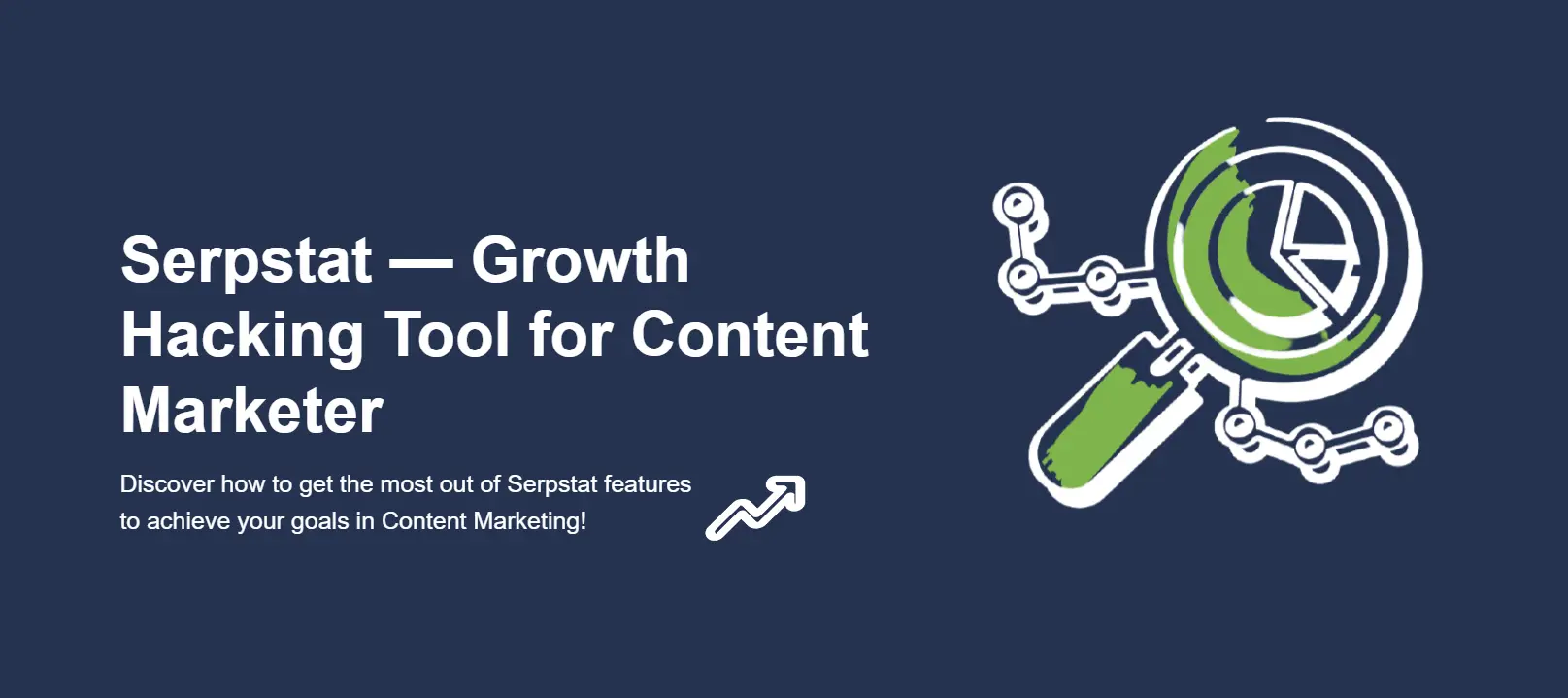
The purpose of this article is to explore ways to automate content creation and optimization using Serpstat AI for content tools. The tools work on the powerful autoregressive language model GPT-3.
The article includes instructions on how to use Serpstat GPT-3 tools.
Most tools require an API token to generate content. You can find your API token in Profile:

Let’s take the journey of article creation together so you understand how each tool works. There are the main steps in article creation:
- topic research;
- pick up the keywords;
- create a structure;
- write a text;
- double check and edit the text;
- add multi-media elements;
- create meta tags.
Topic discover
Firstly, you need to know more about the topic. In this case, type a keyword in the search bar and select a search region to learn roughly what your subject is about, as well as related keywords, their popularity, and their demand. To choose effective keywords for a specific topic, go to the Keyword selection report. Here you will find the list of generated variations of keywords that interest your audience.
The report represents the semantically related keywords to the analyzed theme by which competitors rank in the top 100 Google. That information will allow us to investigate similar keywords and develop new ideas for future articles. For example, the topic is "guitar playing". Using the report, you'll see that users searching for the guitar tab for beginners, the easiest tabs, popular songs, and lessons, except specific "playing the guitar".
Take a mention of the Volume and Keyword difficulty in the report. Keyword volume means the level of keyword popularity and frequency, and keyword difficulty shows the level of competition for a keyword to advance in organic search to the top 10.
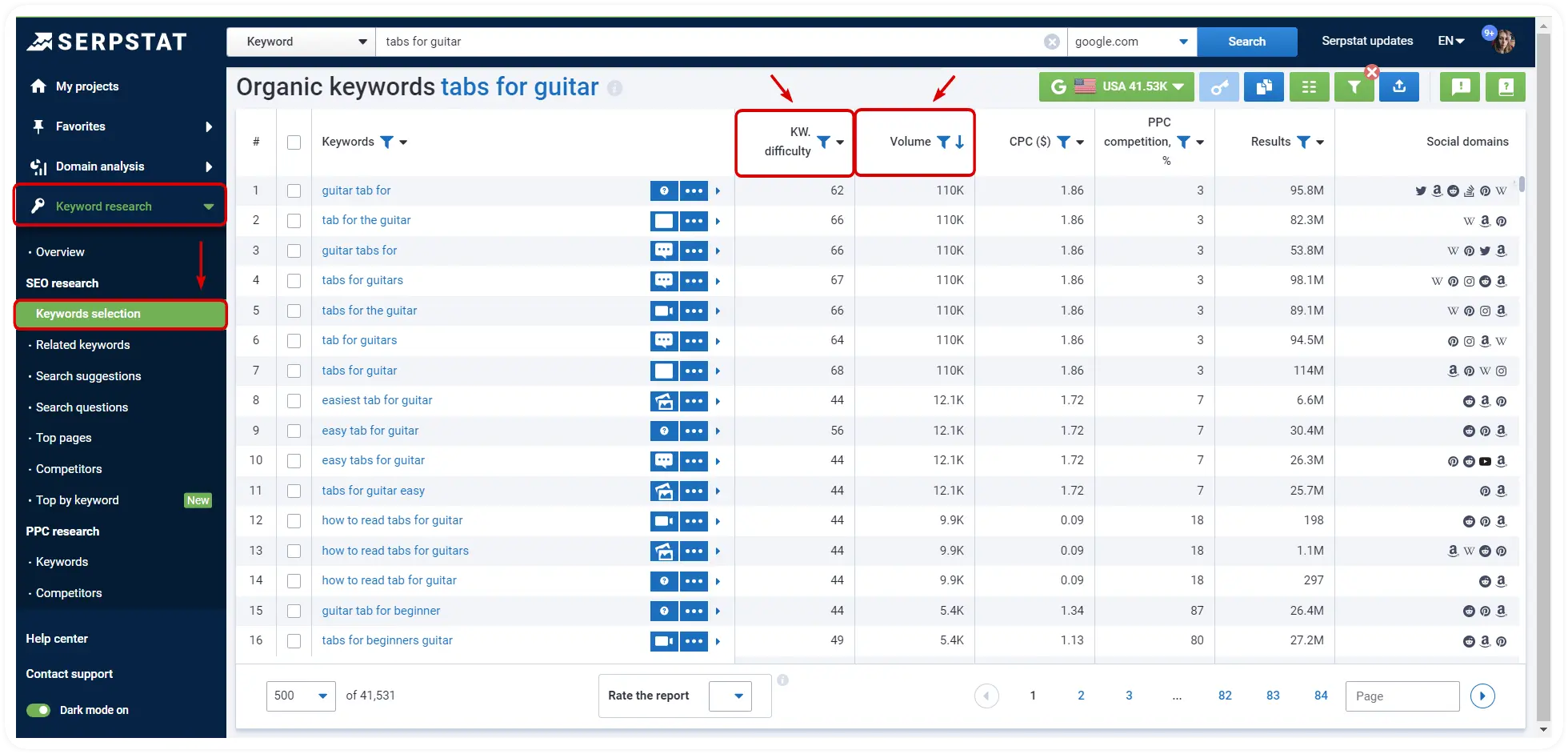
After the topic analysis, it is better to supply the keyword list. In this case, use the Related keywords report. This report shows all semantically related keywords from the top 20 Google SERP in the selected search region.
Adding keywords from the report in the text will increase the topic relevance, which your readers might find quickly.
Notice! Overusing these keywords can result in keyword spamming which leads to distrust from search engines and readers.
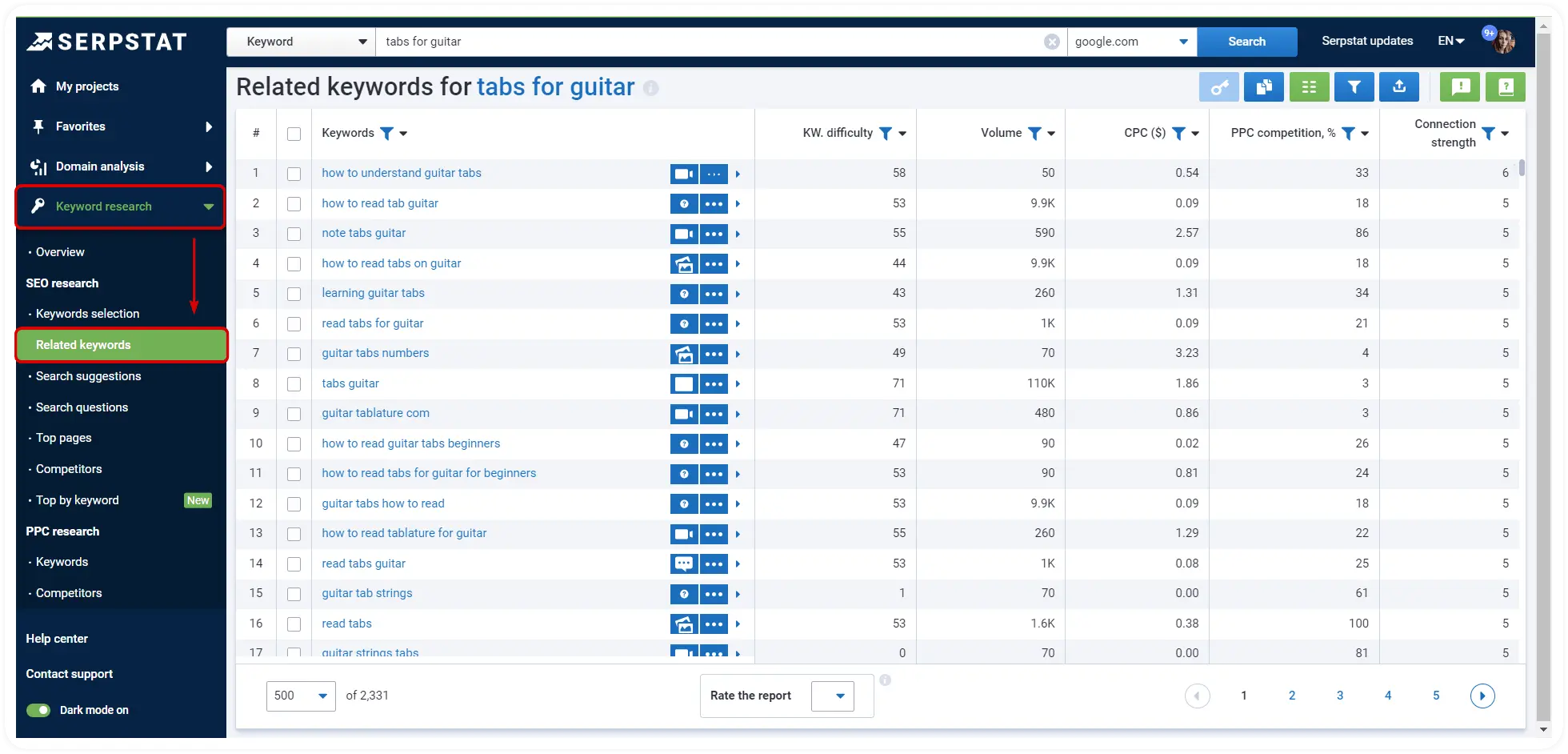
One more report will help expand the article's keyword list — Search suggestions and queries. You will find all the search engine suggestions related to the search queries. For example, by typing the keyword "guitar" the search engine will propose keyword variations such as "guitar chords, tunes, stings, price, lessons".
An article title can be created based on this information. Additionally, it can be used to complete a content plan and expand the text structure.
The Search questions mode makes it easier to form the FAQ section of the content by using the real users' questions from the SERP.
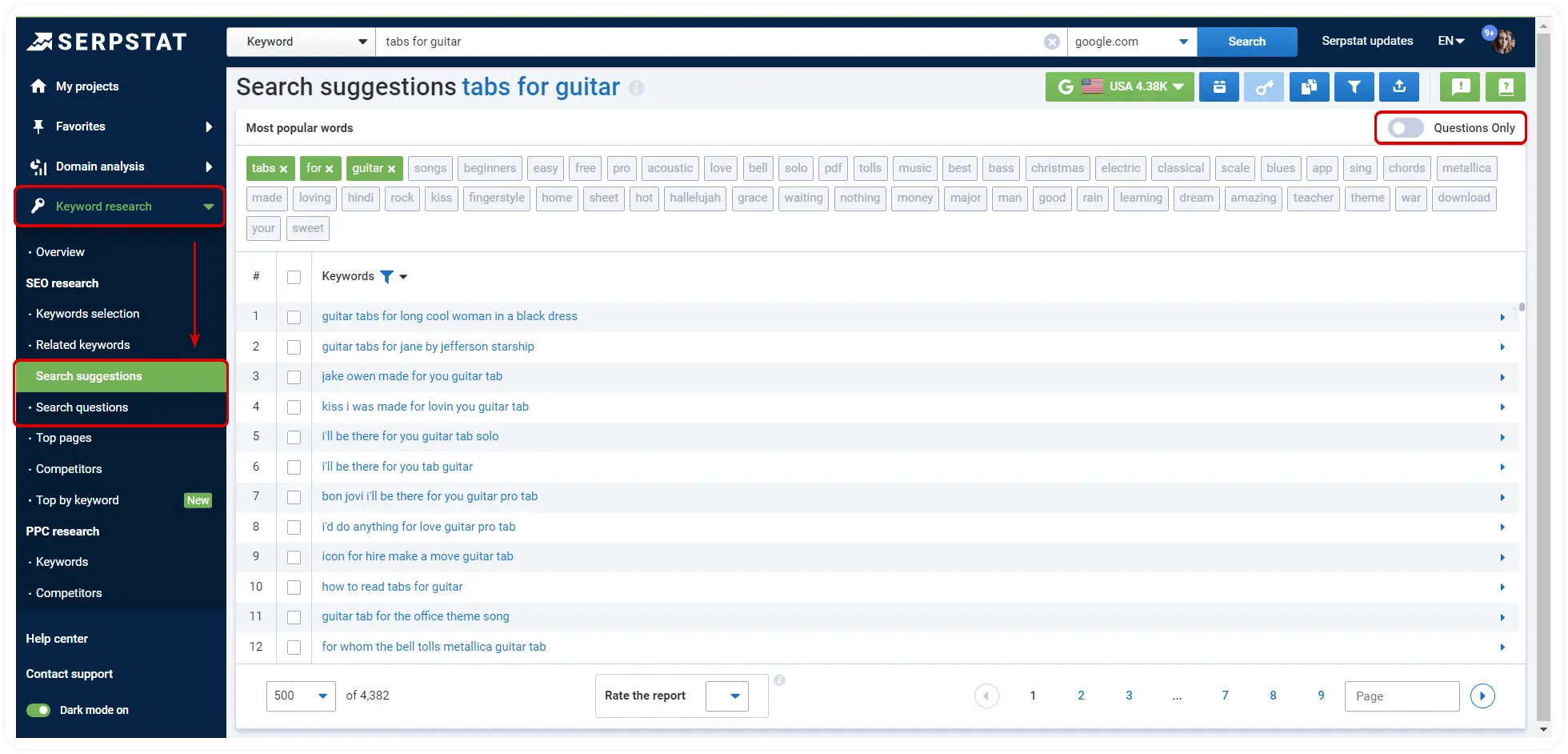
Competitor analysis
One more method of topic research is competitor analysis. The Top pages report will show you the most traffic pages by analyzing keywords and the number of relevant keywords on the page.
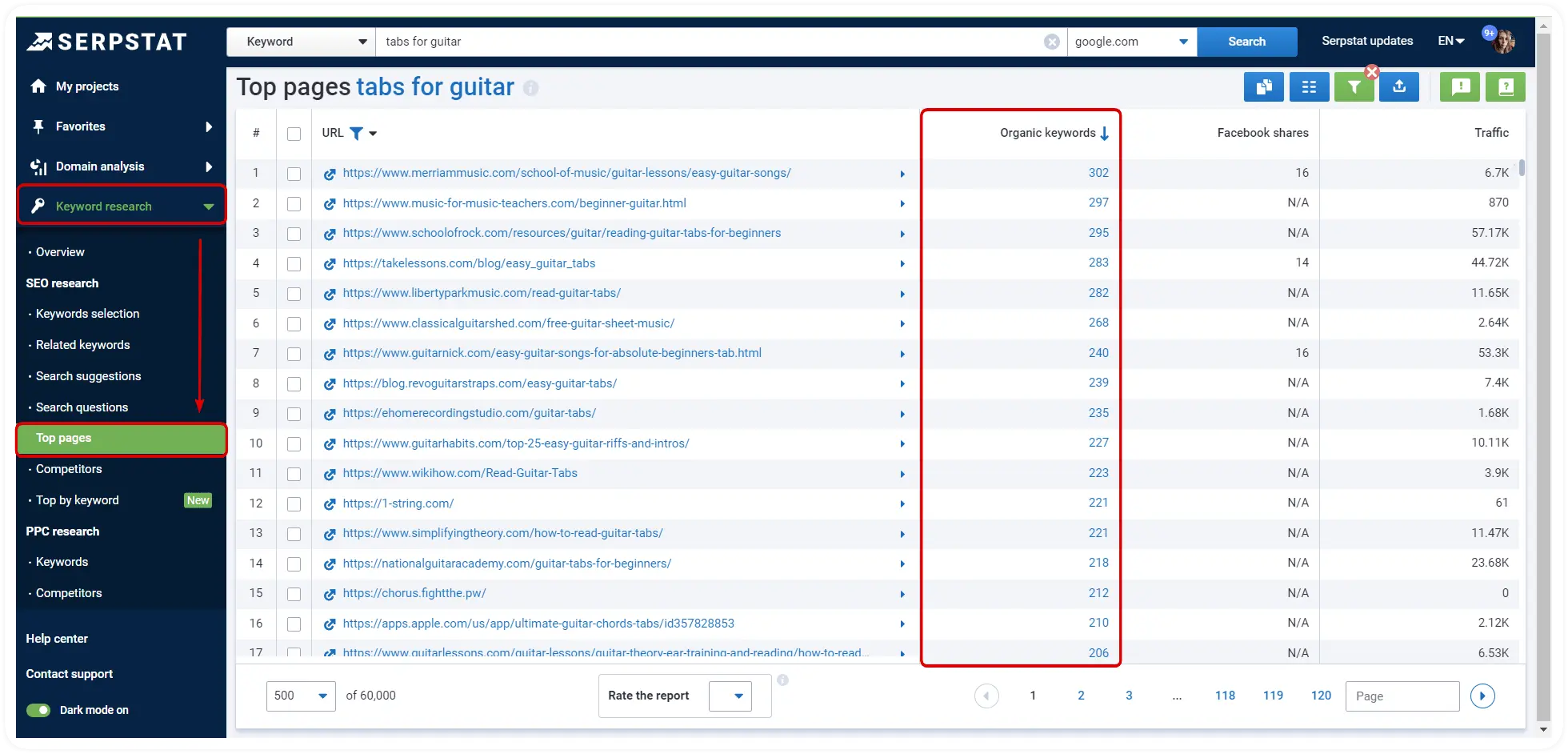
Use filters to choose more specific pages for analysis; for example, it can contain "blog".

How to generate content fast
After choosing the topic and making a keyword list for the article, look into tools that will assist with fast and easy writing of the text and automating content creation.
Text editor
This is an advanced tool for generating articles for the requested search queries and editing them. It will be especially useful when you have collected keywords set for the site but have yet to decide on the topics of articles. Let's see how to use the Text editor with an intergrated article generator.
Specialists who'll find the tool useful the most:
The quickest way to generate an article or blog post is to choose a language, enter a title and click the "Generate article" button. In seconds, the article is displayed in the editor field for further editing.

With the "Article builder" option below, you generate an article step by step:
At each step, you are able to edit the generated content.
Step 1. Title generation.

As you can see, the tool generates several header options. You can choose one or alternately generate content for each topic. You can use the resulting articles on other sites.
Step 2: Outline generation.

Step 3. Paragraphs generation.

Credits:
- Title generation = 50 credits of Tools module.
- Outline generation = 50 credits of Tools module.
- Paragraph generation = 100 credits of Tools module.
- Paragraph paraphrasing = 100 credits of Tools module.
Use cases
Due to the flexibility of the tool, you'll be able to make changes on any stage of creating the content.
You can add a list of relevant keywords that have to be in each paragraph. The resulting blocks of text can be paraphrased or generated again. You can create several variants of the same text. If necessary, text's uniqueness can be raised thanks to the text paraphrasing tool, which we'll also discuss.
Plagiarism checker
The uniqueness of the text is crucial when optimizing it for search engines (SE). Original content ranks higher and gets more traffic than duplicate content. Keeping duplicate content on your site increases the chances of the site being penalized by the SE. Moreover, original content shows your expertise and knowledge on the subject, which will be appreciated both by the SE and visitors of the page.
How do I check if a text contains plagiarism? Everything is simple here.
Specialists who'll find the tool useful the most:
Step 1. Select the language of the text and exclude domains from the analysis if necessary.
Step 2. Enter the text.
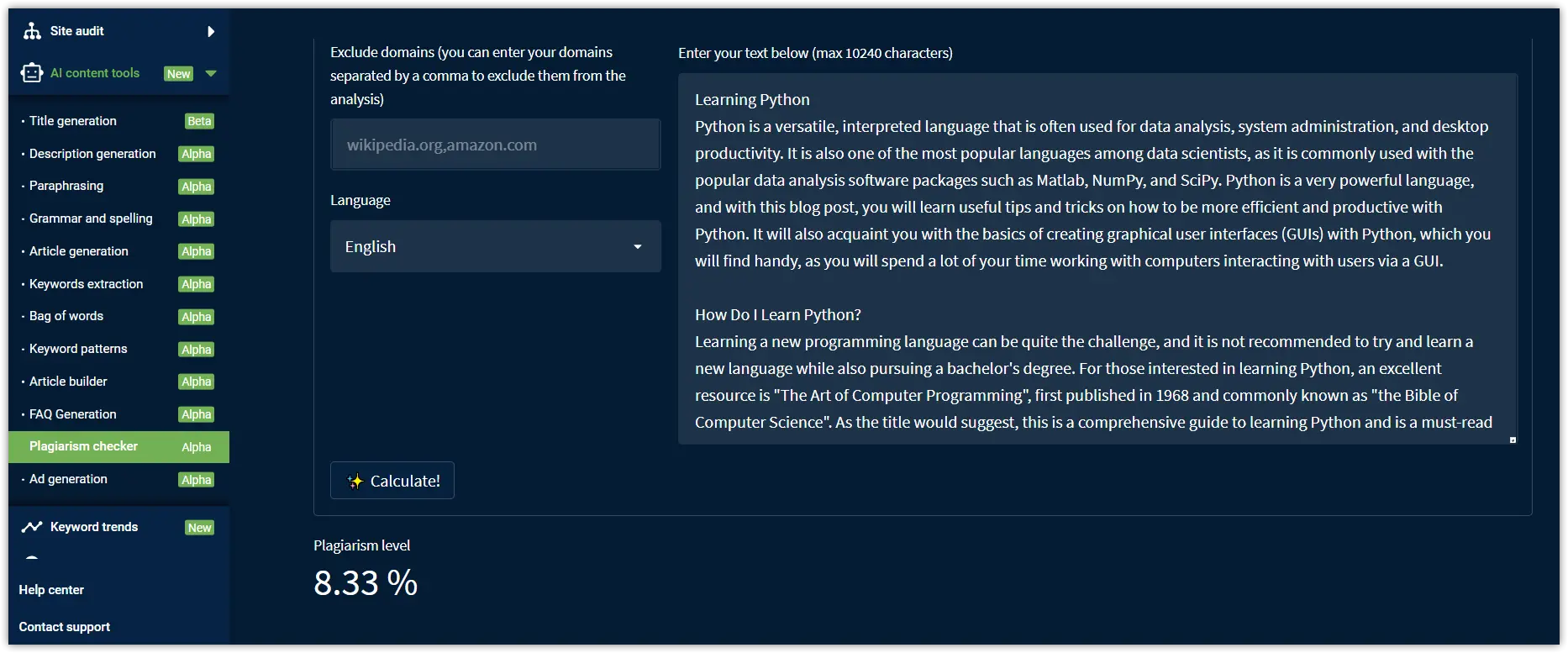
Credits: 1 request = 500 credits (Tools module) for requests in English, 1 request = 750 credits (Tools module) for other languages.
Use case
Occasionally, writers borrow pieces from other sources to write complex texts, but the main thing is not to get a non-unique text as a result.
Before adding new text to your site, check if plagiarism can be detected in it. If plagiarism is found, rephrase the text yourself or use the Paraphrasing tool to increase its uniqueness.
The tool allows you to check texts of up to 10 thousand characters in 26 languages.
In the report, you will see URLs of pages you have a match with in case of plagiarism found.
Paraphrasing
Text paraphrasing is one more way to generate new content. Earlier, we got the list of pages with the highest traffic by analyzing the theme in the Top pages report. Select one of these pages and pick the appropriate text to work with.
Specialists who'll find the tool useful the most:
Step 1. Select the language.
Step 2. Copy and paste the text into the Paraphrasing tool. The tool will automatically rewrite it without content loss and save the initial message.
Right below is the text difference percentage metric.
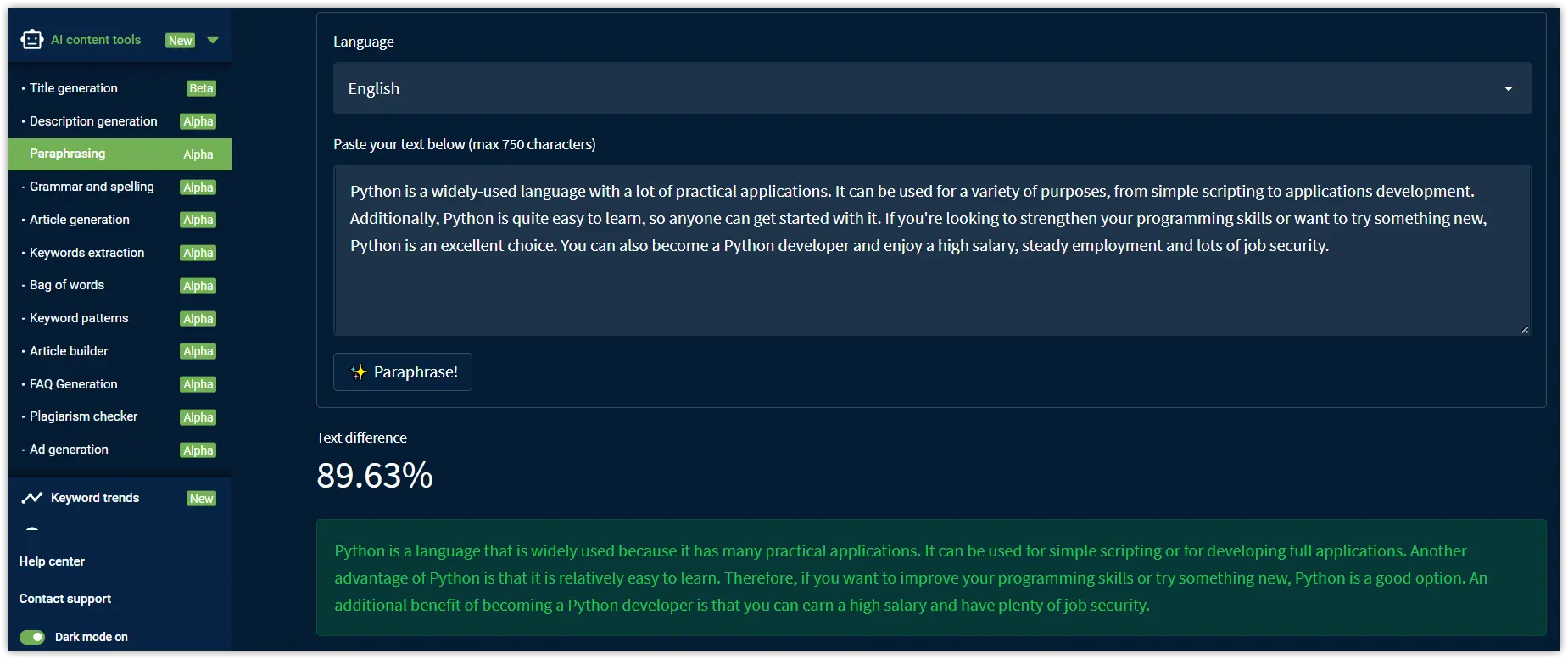
Credits: 1 request = 500 credits (Tools module) for requests in English, 1 request = 750 credits (Tools module) for other languages.
Use cases
Unique text is not just about the number of different words in the sentence but the quality of information that benefits readers and the topic's relevance. Search engines don't demand high-quality metrics, but low text uniqueness will complicate rankings in SERP due to being defective. Talking about positive effects for highly unique texts for readers — useful, accurate information, individuality, and originality. All these aspects prolong the time on-site, improve conversion, and decrease bounce rate. That means you get excellent SEO texts.
Check the spam level
The next step is determining whether there are spam, overused keywords, or keyword stuffing. Keyword stuffing means using the same keywords in the website content many times and trying to manipulate site's rankings. It directly affects your SEO performance since search engines pay close attention to webspam and such action may lead to penalties. Let's check if there are overused keywords.
The Bag of words tool will help detect such keywords.
Specialists who'll find the tool useful the most:
Step 1. Copy the text, add it to the relevant field.
Step 2. Start the analysis. The result will be ready in a few seconds!
The tool checks how often the keyword is mentioned in the text (the freq column) and displays the results in a table. Detect which keywords are overused and which are seldom used, and correct your text.
There’s one more way to add text to the tool — change the source to “From URL”, and add a link to your website's page; this will enable you to get a report on the level of keyword spam.
Avoid webspam on your site to minimize the chances of being penalized, provide a positive user experience, and show the authenticity of your content.
Use the most used keywords as tags or categories in your blog. By tagging articles, you can improve navigation, save the logic categorized order, and increase the average time on the page. Or use them as filters for searching definite items, for instance.
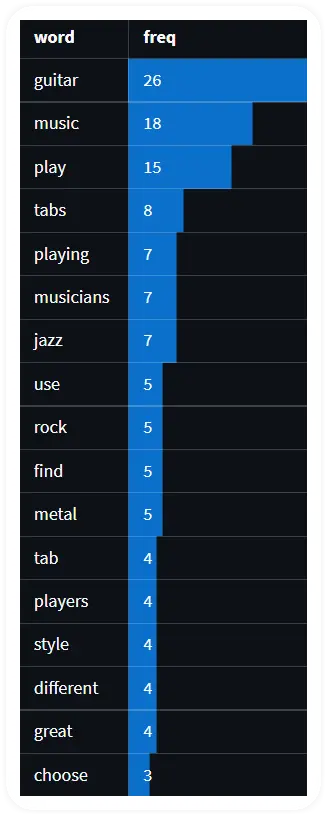
Credits: 1 request = 100 credits of the Tools module.
Use cases
Keywords extraction
So, the article is ready, and now we need to review its relevance to the selected topic. The Keyword extraction tool will display a list of the most relevant keywords, since it works on artificial intelligence. Moreover, you can get such a list for any page to track the positions' dynamics in Rank tracker or quickly understand the main text’s topic.
Specialists who'll find the tool useful the most:
Step 1. Set up appropriate settings for an extraction based on your task:
- a model — if you're not sure which one to use, try different ones and then stay on the one that works best for you;
- # of results — number of keywords to display;
- Minimum/Maximum Ngram — number of words in a keyword;
- remove stop words — removes stop words from the document;
- MMR — the level of relevance to the added text, the higher the settings the more diverse the keywords;
Step 2. Run the analysis.
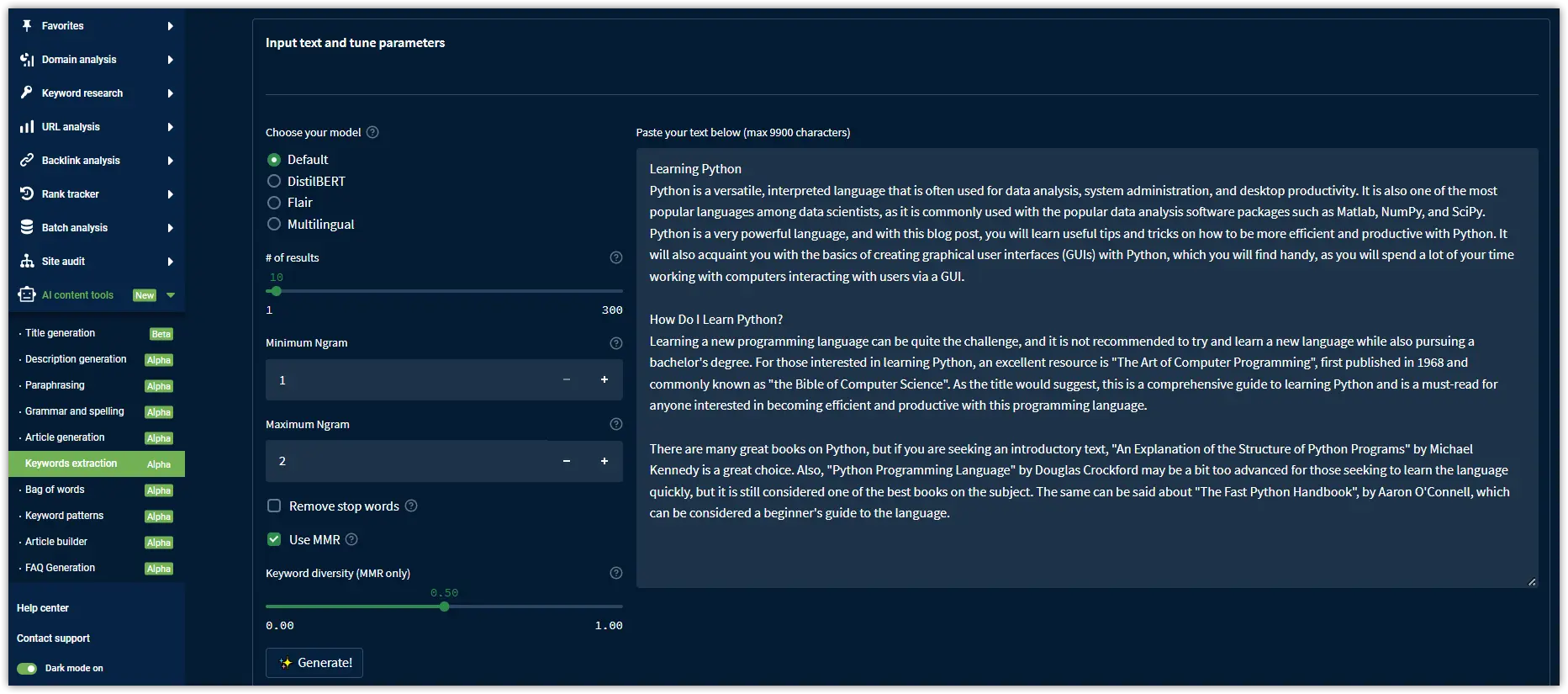
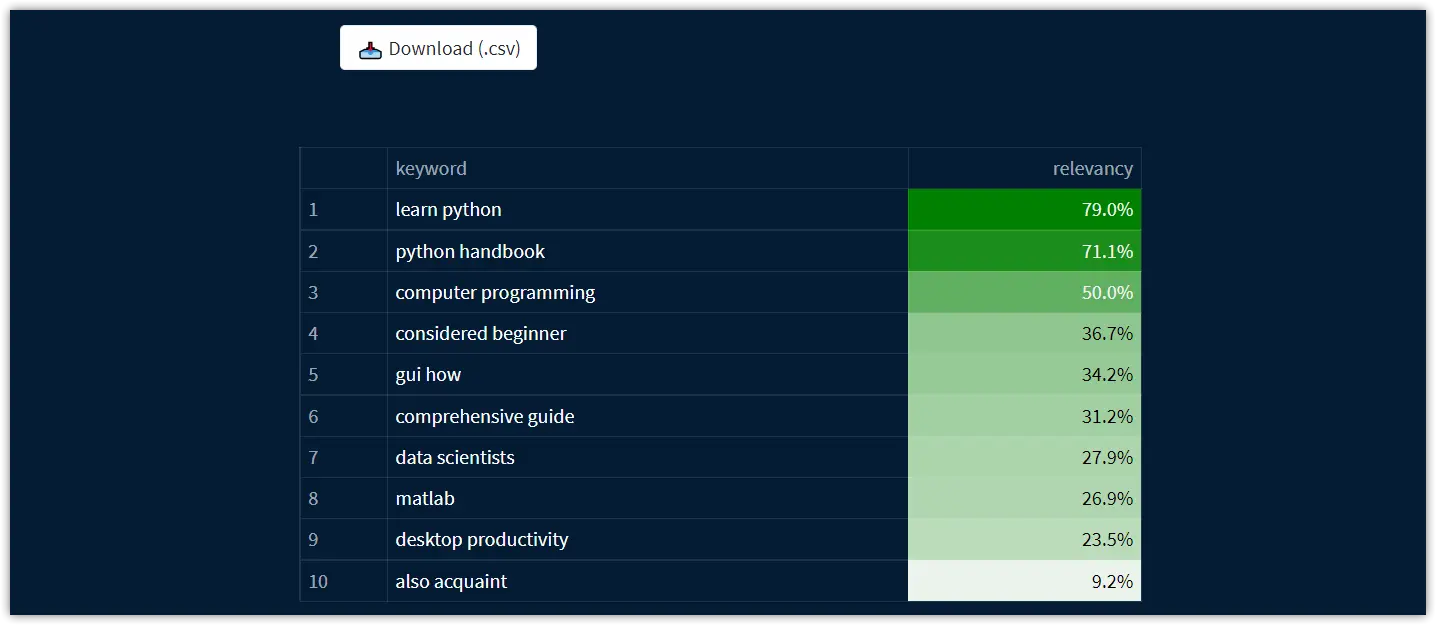
Credits: 1 request = 100 credits of the Tools module.
Use case
You found a competitor's article, which drives a lot of traffic and gets positions in the top of the SERP. Copy the article text and paste it into the tool. Get a list of keywords from the competitor's article. Filter out irrelevant keywords from the list to keep the ones you'll add to the content of your site.
The tool will extract keywords from the entered text showing the relevance of each keyword to the text.
Keyword extraction is an important part of keyword research and competitive analysis when optimizing the content on your site. Extracted keywords will assist you in understanding the topic of the text quicker, identifying keywords used in the text by competitors, and even getting ideas for PPC campaigns. All of this will improve your site's visibility in search results and increase traffic.
Download the result, then quickly check the keyword list in the Keyword batch analysis tool. You will be able to get data about customers' demands, monitor the dynamic of metrics, and measure the actual situation.
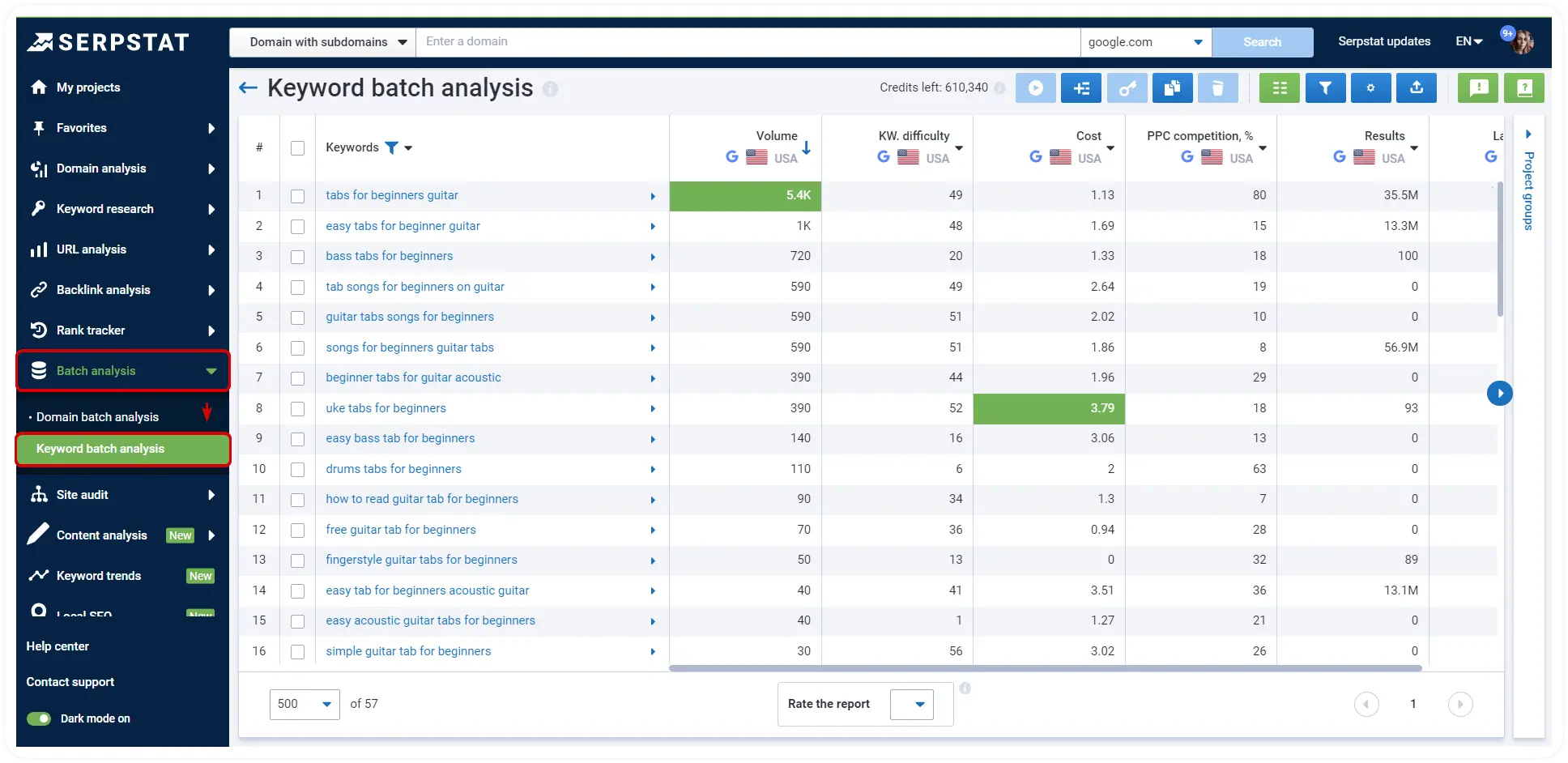
Once the article is published, this keyword list can be tracked in real-time by your website's pages through the Rank tracker tool with the selected search region. Create a new project, add the keyword set from the Keyword extraction report, and assume the expected URL.
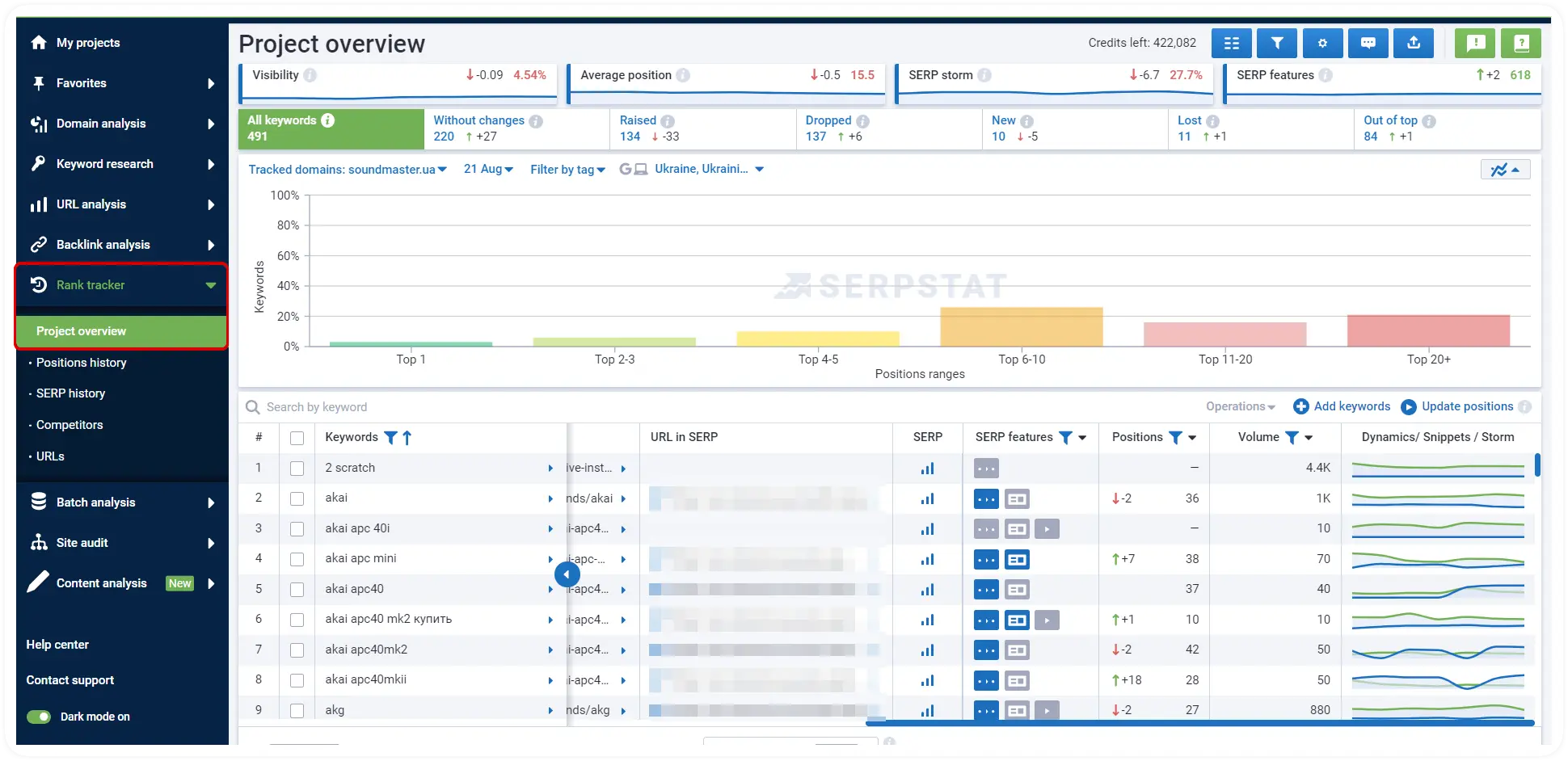
Writing tips
Afterward, organize the text. The design of external text directly affects customers' interaction with content, increases their time spent on the page, and improves their ability to comprehend information. Organizing and designing your content may be relevant depending on what you created. Some standard formats include:
- Clear structure — logically ordered text helps to develop a theme. Organizing text in paragraphs and headers helps establish the text's main points and highlight major viewpoints, giving customers the necessary information. The title has to be relevant to the text inside it;
- Adding graphs, numbered lists, and illustrations will attract customers' attention, help them remember information better, and help them understand what you're trying to convey. Maintain the quality of the images; otherwise, it can experience adverse effects;
- By adding CTA elements (call-to-action), visitors will be encouraged to interact more with the content by commenting, liking, sharing, and subscribing to blog posts;
- Stick to a certain style — each section has to be similar to the previous and the next, externally and semantically. Try to keep equal gaps between text sections, use the same font style (recommended for all content on your website, not even for one article), and add a few moderate multi-media elements. It is best to avoid keeping all your accents in one section and categorize your information.
Title and Description optimization
After the main work is done, let us optimize meta tags on your pages, this will help your future readers find the text faster.
Meta tag optimization is a crucial part of on-page SEO optimization and causes search rankings to increase. With these meta tags, the search engine completes the snippet with brief information about the page.
The SEO specialist's task is to write relevant meta tags that answer the customer's questions regarding the content on the page.
The Title generation and Description generation tools assist in creating meta tags in a few clicks! They form meta tag text by the text summary.
Specialists who'll find tools useful the most:
Step 1. Enter the text for the analysis.
Step 2. Get the generated title below the analyzed text.
To generate meta tags, you can use texts of up to 1,000 characters.
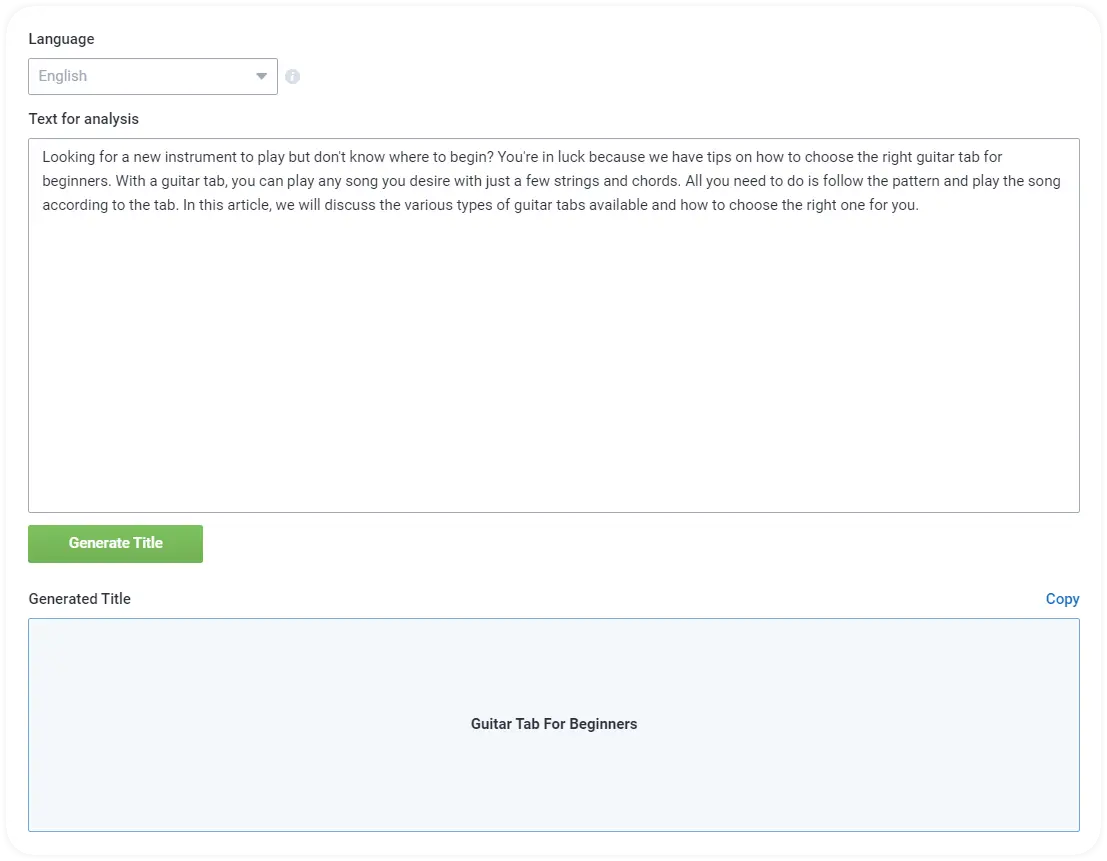
Credits: 1 request = 150 credits.
For the description generation, the steps are almost the same.
Step 1. Select the language of the text.
Step 2. Enter the text for the analysis.
Step 3. Get generated meta tag below the analyzed text.
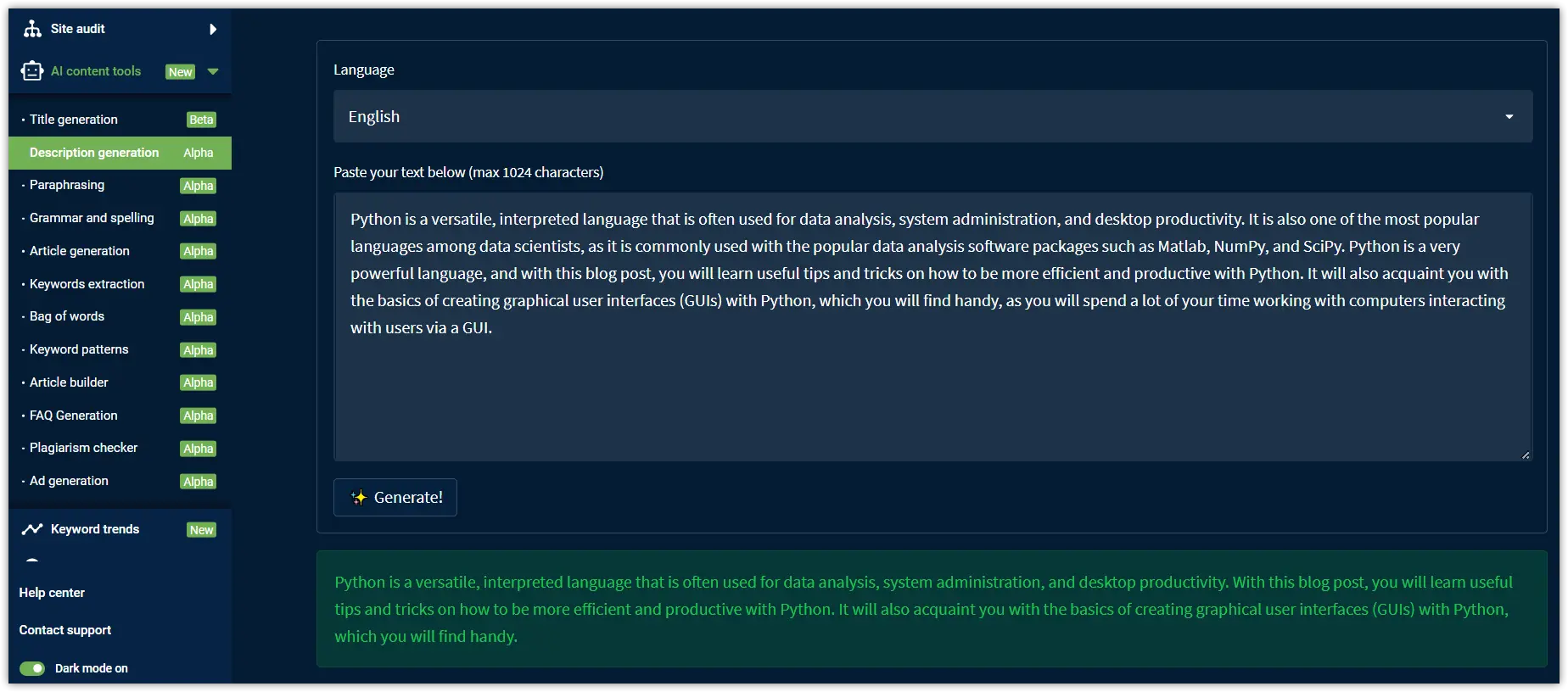
Credits: 1 request = 150 credits (Tools module) for requests in English, 1 request = 450 credits (Tools module) for other languages.
Use case
To optimize snippets and show pages' relevancy to the search engine, you must create meta tags corresponding to the user's query. Optimizing snippets for keywords increases the chance that the user will click on the link to read more. It's important to choose the right keywords in the title and description, and to represent the information correctly to lead the user to that page.
YouTube transcription
Video-to-text transcription can be done in different ways: manually, by delegating it to performers, or automatically with additional tools. We can all agree that manual transcription takes too much time, and delegating it to performers may not be of the quality we expect.
This tool converts YouTube videos to text automatically transferring you straight to the editing stage.
Specialists who'll find the tool useful the most:
Step 1. Paste a link to a YouTube video.
Step 2. Get the transcript to continue working on.
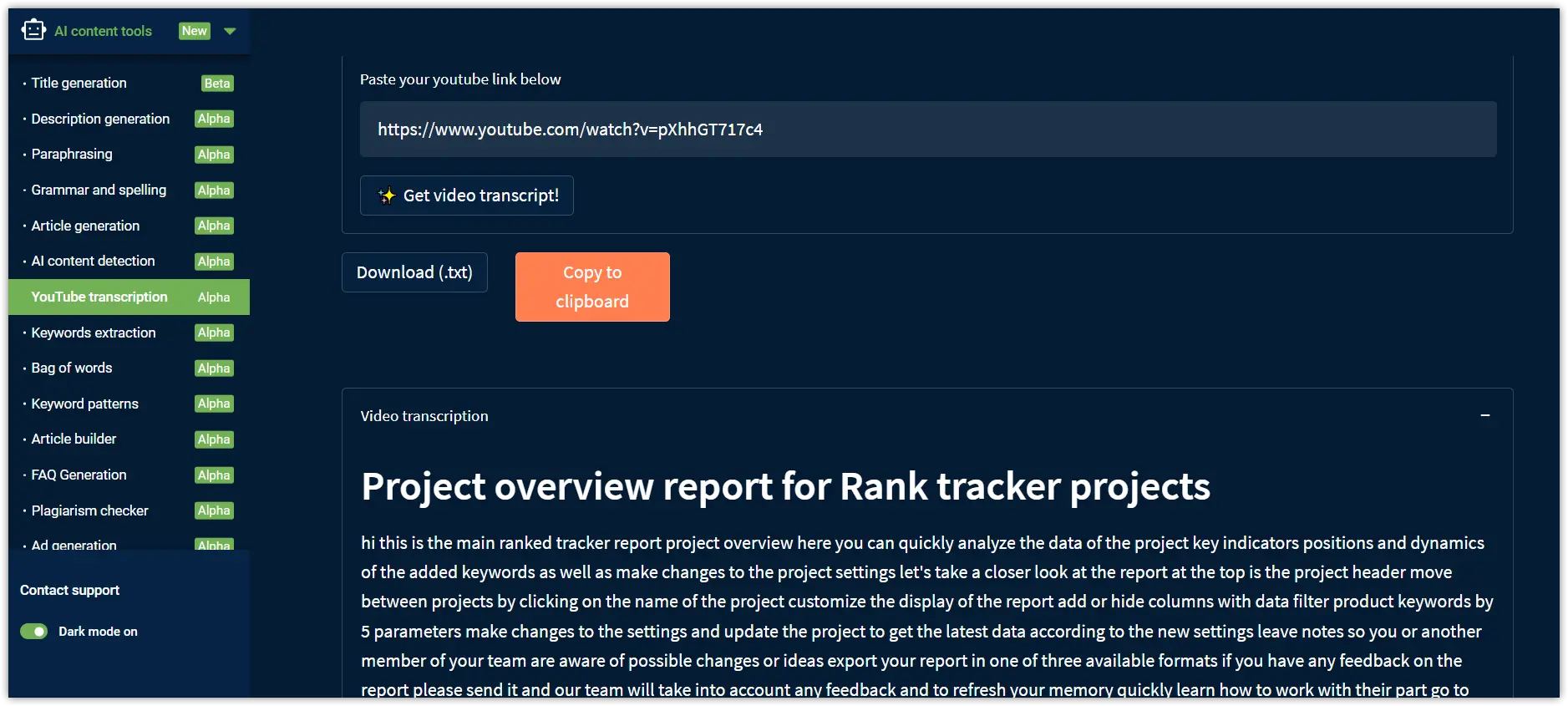
Credits: 1 request = 100 credits of the Tools module.
Use case
To reach a wider audience, create content in different formats. Take a video you've published and transcribe it. Use the transcription to translate it and localize it to another language, extract key points from it in Bag of words tool, write a content plan or an article, or prepare newsletters.
As usual with AI tools, the generated content should be edited depending on your final goal to ensure the highest text quality.
AI content detection
The AI content detection tool determines whether the text was written by a human or artificial intelligence. Specifically, it shows the percentage of human to artificial intelligence writing.
Specialists who'll find the tool useful the most:
Step 1. Copy and paste the text into the tool.
Step 2. Get results immediately.
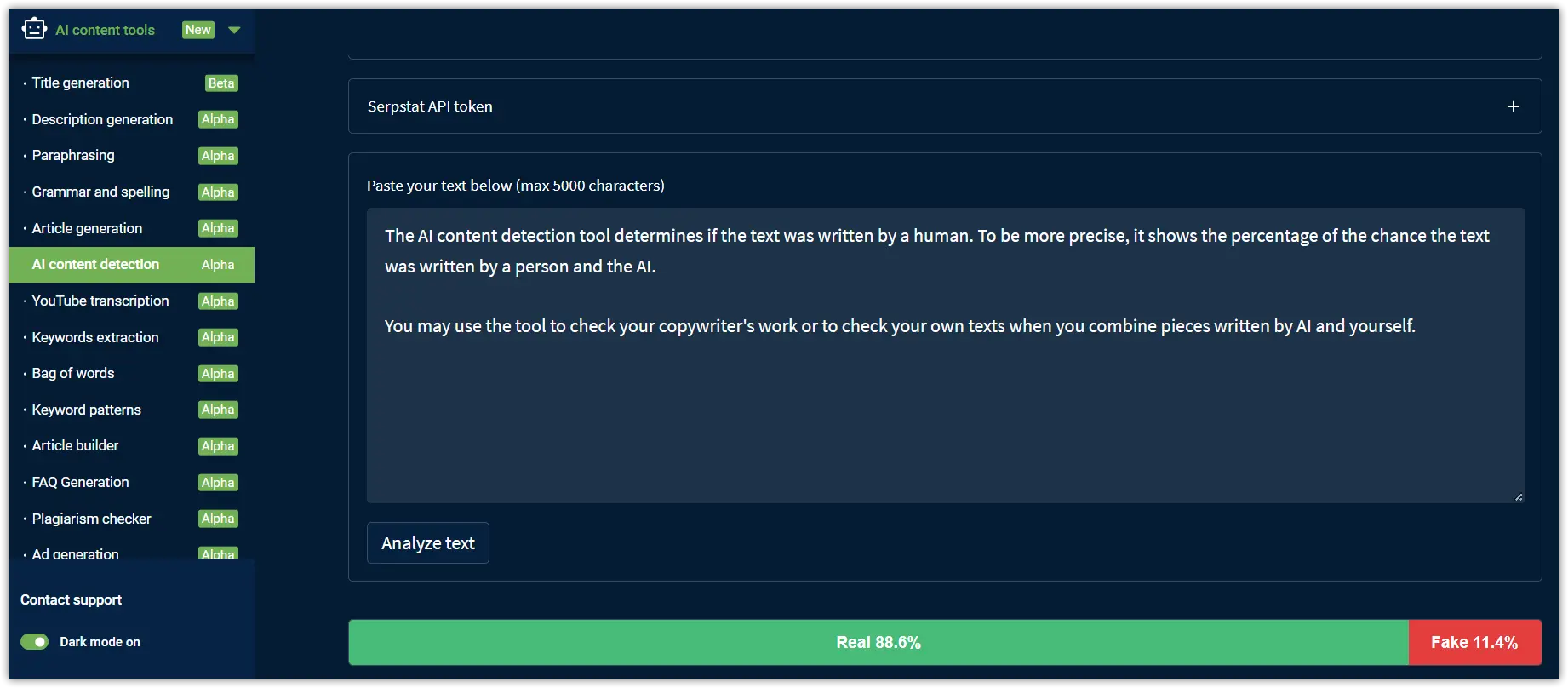
Credits: every 1000 character of text = 100 credits of the Tools module.
Use case
Check the article a copywriter wrote or your own work when you combine snippets written by the AI and human or borrow some pieces from other resources. Optimized texts are better perceived by the AI and improve the SEO quality of the site.
Conclusion
Create strategies for automating each process using Content analysis tools that make your daily tasks easier at every stage. All who engage with text will find the tools helpful, whether website owners, copywriters, editors, SEO specialists, or anyone else who creates content.
In addition to SEO optimization, remember that your customers, clients, and readers are the primary evaluators of your website. You must create informative, relevant, and unique content, regardless of what kind of content you are making. A continuous cycle of text improvements increases user trust and improves the resource's attraction.
The platform provides all the tools you need in one place, so you don't need to purchase any additional services. Analyze competitors in your business field, analyze keywords and search queries, and improve your content to keep it unique.
Still have questions? Contact the technical support chat.
Recommended posts
Cases, life hacks, researches, and useful articles
Don’t you have time to follow the news? No worries! Our editor will choose articles that will definitely help you with your work. Join our cozy community :)
By clicking the button, you agree to our privacy policy.